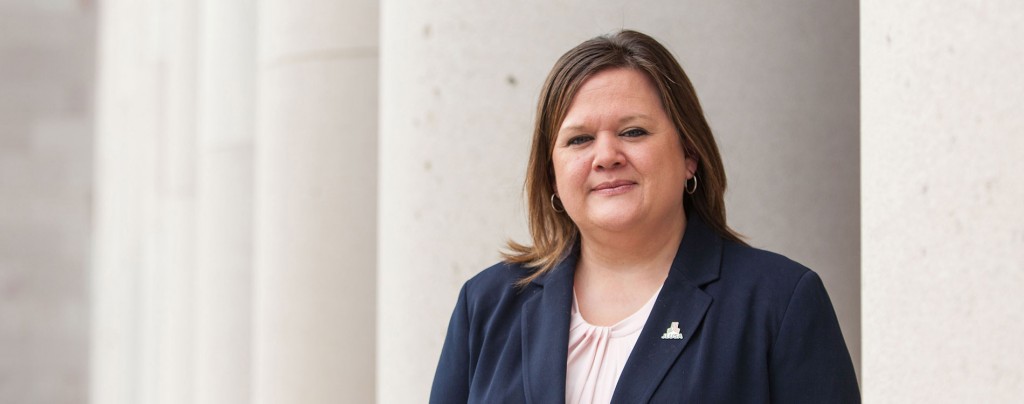Page 345 • (3,470 results in 0.129 seconds)
-
her time on The Voice. Guest Contributors Samuel Torvend, Ph.D. Samuel Torvend, Ph.D., is professor of the history of Christianity and currently serves as the university chair in Lutheran studies. As a historian of Christianity, his research focuses on the history of religious responses to poverty and food insecurity. He also teaches courses on religious art and architecture and their role in reforming movements. Among his published works are Luther and the Hungry Poor: Gathered Fragments . Kevin
-
Dean of the College of Liberal Studies) What gets you up in the morning? I get my greatest sense of purpose by going to work. How does your work at PLU impact the PLU community? My job has grown over the years and I’ve been able to learn how to guide our faculty, create ideas, and take in their ideas. If faculty had a student that was panicking in their class, I would be the one to listen to what other folks have to say, get them something to eat or drink, and when they start calming down, you can
-
Lutheran studies at PLU, explained that Luther’s native Germany was already a hotbed of discontent, with many Germans increasingly frustrated with church practices. Torvend said Luther’s path to revolution started with a personal quest to find answers to his own questions about salvation and damnation. He would frequently ask his religious superiors what he needed to do in order to be with God in the afterlife. “That really kind of drove him crazy,” Torvend said. “On the one hand he’s told he can do
-
members selected from a nationwide pool of applicants. The five- day event was offered by the Council of Independent Colleges and Interfaith Youth Core, a nonprofit organization working to make interfaith cooperation a social norm. Hammerstrom and other educators from various universities learned about engaging students in constructive dialogue. They dealt with case studies that each participant brought to the table, springing from everyday experiences and challenges related to religion. He said
-
students’ working relationship with faculty members helps students become entrenched in their studies. Through student-faculty research, students incorporate their own experiences with academia in a way that Lewis says improves critical thinking, writing and understanding of students’ subjects of interest. Cynthia Waite '20 Waite’s project, a study of faculty-student mentoring, caught the spirit of the day. Psychology Professor Wendelyn Shore, an expert on the topic, was Waite’s mentor, and was
-
era.School of the ArtsDate and Artist: 1988; Tom Torrens See it: Located on the western entry of upper campus. “The School of the Arts” sign is a combination of materials including neon letters that spell out “arts”. This is sculpture was commissioned by the School of Arts now the College of Professional Studies and is approximately eight feet long and eight feet high.Generations of OakDate and Artist: October 26, 1995; Kathryn Wold (Sparks) See it: Located on lower campus below the music center. The
-

applied (for the bar).” Simmons went all in on that bet. She met with Shon Hopwood, a lawyer and author of “Law Man: My Story of Robbing Banks, Winning Supreme Court Cases, and Finding Redemption.” Hopwood graduated from the University of Washington Law School after serving time for crimes he committed. “He said ‘you absolutely can (become a lawyer),’” Simmons recalled, “and he told me exactly how to do it.” And she did. Just as she did during her time at PLU, Simmons leaned into her studies and then
-
, Simmons leaned into her studies and then some. She got to know legislators in Olympia, working on criminal justice reform. She did internships, externships and other work that far exceeded the status quo. Strait and Simmons were confident when they brought the body of work to the Washington State Bar Association Character and Fitness Board for review, ahead of her bar application. “He said in all of his life he had never seen a record of rehabilitation like mine,” Simmons said. “He felt really, really
-
Course Descriptions GNUR 640 : ENP Procedures Provides the Emergency Nurse Practitioner student with a range of diagnostic and interventional skills used in urgent care and emergency settings; including, the ability to understand, manage, and safely perform these procedures. (2) (2 credits lab/seminar) GNUR 641 : ENP I: Lifespan Emergency Care This course covers the skills of assessment, interpretation of diagnostic studies, interventions, and treatments unique to the Emergency Nurse
-
Course Descriptions GNUR 640 : ENP Procedures Provides the Emergency Nurse Practitioner student with a range of diagnostic and interventional skills used in urgent care and emergency settings; including, the ability to understand, manage, and safely perform these procedures. (2) (2 credits lab/seminar) GNUR 641 : ENP I: Lifespan Emergency Care This course covers the skills of assessment, interpretation of diagnostic studies, interventions, and treatments unique to the Emergency Nurse
Do you have any feedback for us? If so, feel free to use our Feedback Form.


